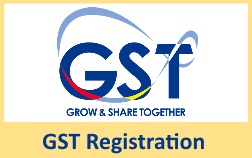Why Companies Choose the very best GST Registration Services in Singapore
Why Companies Choose the very best GST Registration Services in Singapore
Blog Article
From Beginning To End: The Ultimate Roadmap to GST Registration for Organizations Looking For Financial Stability
Browsing the complexities of Item and Provider Tax Obligation (GST) enrollment is a crucial action for services pursuing monetary security. From understanding the essential principles of GST to abiding by post-registration standards, the process can appear daunting in the beginning look. Damaging down the roadmap into manageable actions can enhance the registration trip for organizations looking to enhance their monetary standing. Allow's check out the crucial parts that compose this best roadmap and find exactly how each phase adds to laying a solid foundation for financial success.
Recognizing GST Basics
Digging into the basic concepts of Item and Solutions Tax (GST) is necessary for getting an extensive understanding of its ramifications on businesses and the economic climate. Input Tax Credit Report (ITC) is a considerable attribute of GST, permitting organizations to claim credit rating for tax obligations paid on inputs, lowering the overall tax burden. Understanding the essentials of GST is essential for organizations to comply with tax obligation laws, handle their funds successfully, and add to the nation's economic development by getting involved in a clear tax obligation system.
Eligibility Criteria for Registration
To sign up for GST, companies have to fulfill specific eligibility requirements established by the government. The key eligibility requirement is that any kind of company included in the supply of products or services with a yearly accumulation turn over over the threshold restriction established by the authorities should register for GST. As of the present guidelines, the threshold limitation for GST enrollment is a yearly accumulation turn over of 40 lakhs for businesses running within a state, except for special group states where the restriction is 20 lakhs. Furthermore, particular businesses are required to sign up for GST irrespective of their turn over, such as interstate providers, casual taxable individuals, and businesses reliant pay tax under the reverse fee device. It is vital for companies to completely analyze their turnover and deal kinds to establish their GST enrollment obligations properly. Failure to sign up for GST when eligible can bring about fines and legal repercussions, making it vital for services to stick to the defined eligibility criteria.
Records Required for Registration
Having actually fulfilled the eligibility requirements for GST registration, organizations need to currently ensure they have the requisite papers in position to proceed with the registration procedure efficiently. The files needed for GST enrollment commonly consist of proof of business constitution, such as partnership deed, registration certificate, or consolidation certificate for different kinds of services. Additionally, organizations require to offer papers developing the primary area of service, such as a rental arrangement or power costs. Frying pan card of business, in addition to the identity and address proof of promoters/partners/directors, are important for verification functions. Savings account statements, along with canceled cheques or a duplicate of the financial institution passbook, are required to confirm the monetary details offered during enrollment. Organizations need to have digital trademarks prepared for the licensed signature. Making certain all these papers are organized and conveniently offered will speed up the GST enrollment process, allowing companies to comply with tax obligation policies seamlessly.
Step-by-Step Enrollment Process
Starting the GST registration process entails a collection of structured steps to make certain a certified and smooth registration for services. The initial step is to go to the GST site and complete the registration type with exact information of business entity. Following this, the applicant gets a Temporary Reference Number (TRN) which is utilized to return to the application process if it's not finished in one go.
Next, all needed papers according to the list supplied by the GST portal requirement to be published. These papers typically consist of evidence of service address, identity and registration proofs of promoters, financial statements, and business entity's PAN card.

Post-Registration Conformity Guidelines

Conclusion
Finally, companies seeking financial security must comprehend the essentials of GST, fulfill qualification requirements, gather necessary records, comply with the step-by-step registration procedure, and abide by post-registration guidelines - Best GST registration services in Singapore. By sticking to these actions, companies can ensure conformity with tax obligation policies and keep monetary stability over time
Furthermore, certain organizations are called for to sign up for GST irrespective of their turnover, such as interstate vendors, casual taxed persons, and businesses accountable to pay tax under the reverse cost system.Having actually satisfied the eligibility requirements for GST registration, services should currently ensure they have the requisite documents in location to proceed with the registration procedure effectively. The documents required for GST enrollment usually include evidence of business constitution, such as collaboration deed, enrollment certificate, or consolidation certification for different kinds of businesses. Furthermore, organizations need to give documents developing the major place of service, such as a rental agreement or power bill.Beginning the GST enrollment process involves a collection of organized steps to make sure a certified and smooth registration for businesses.
Report this page